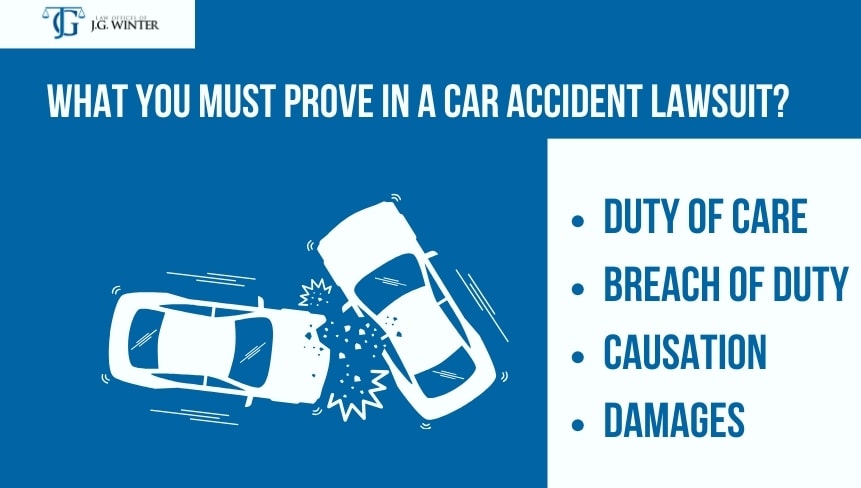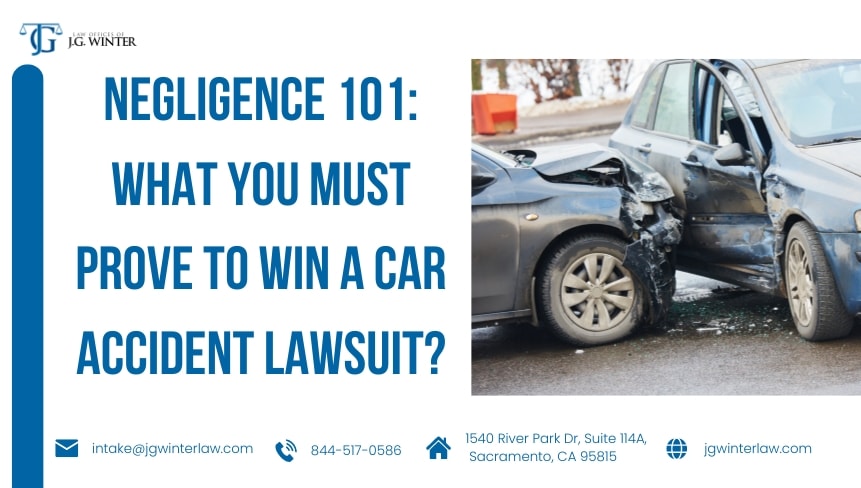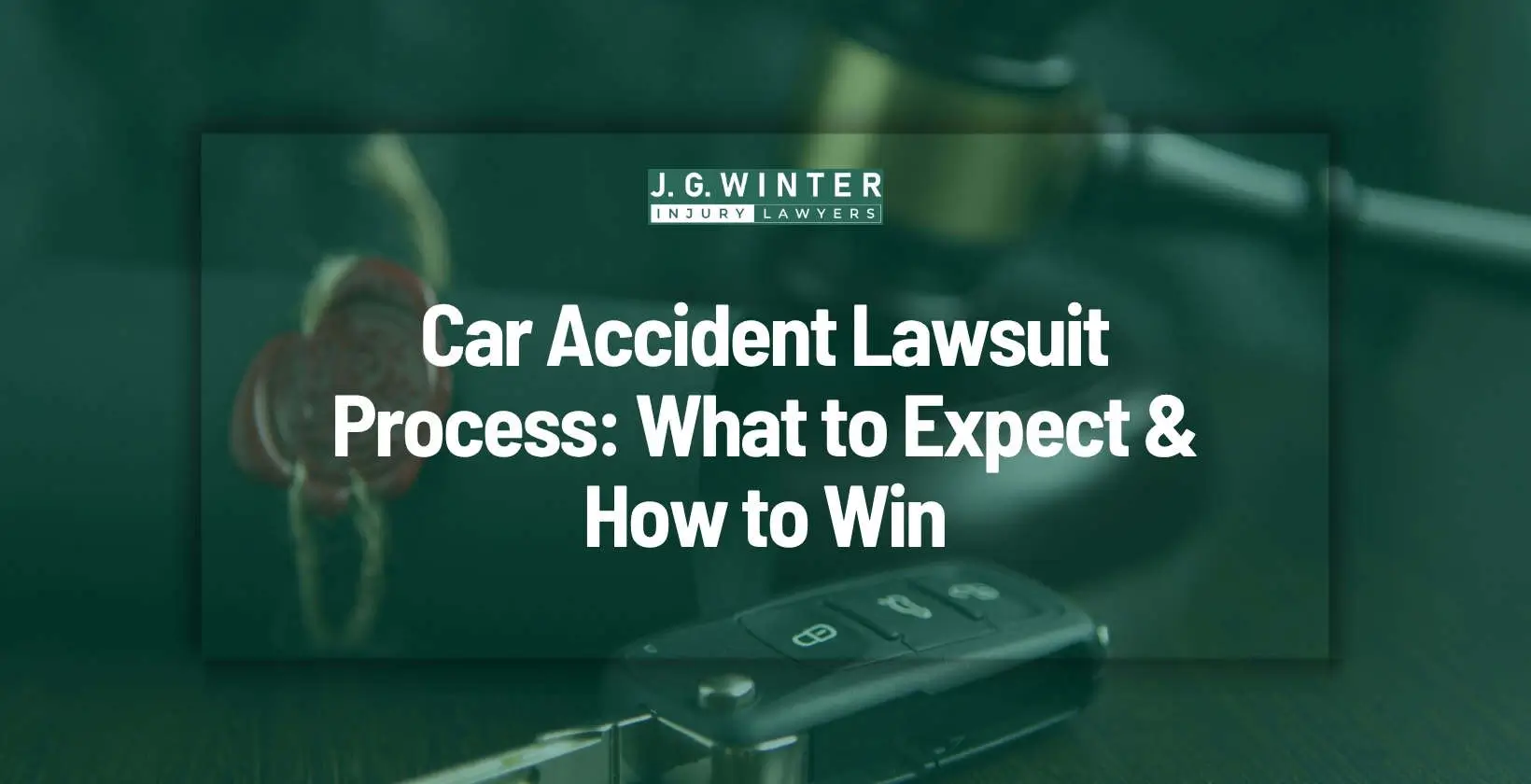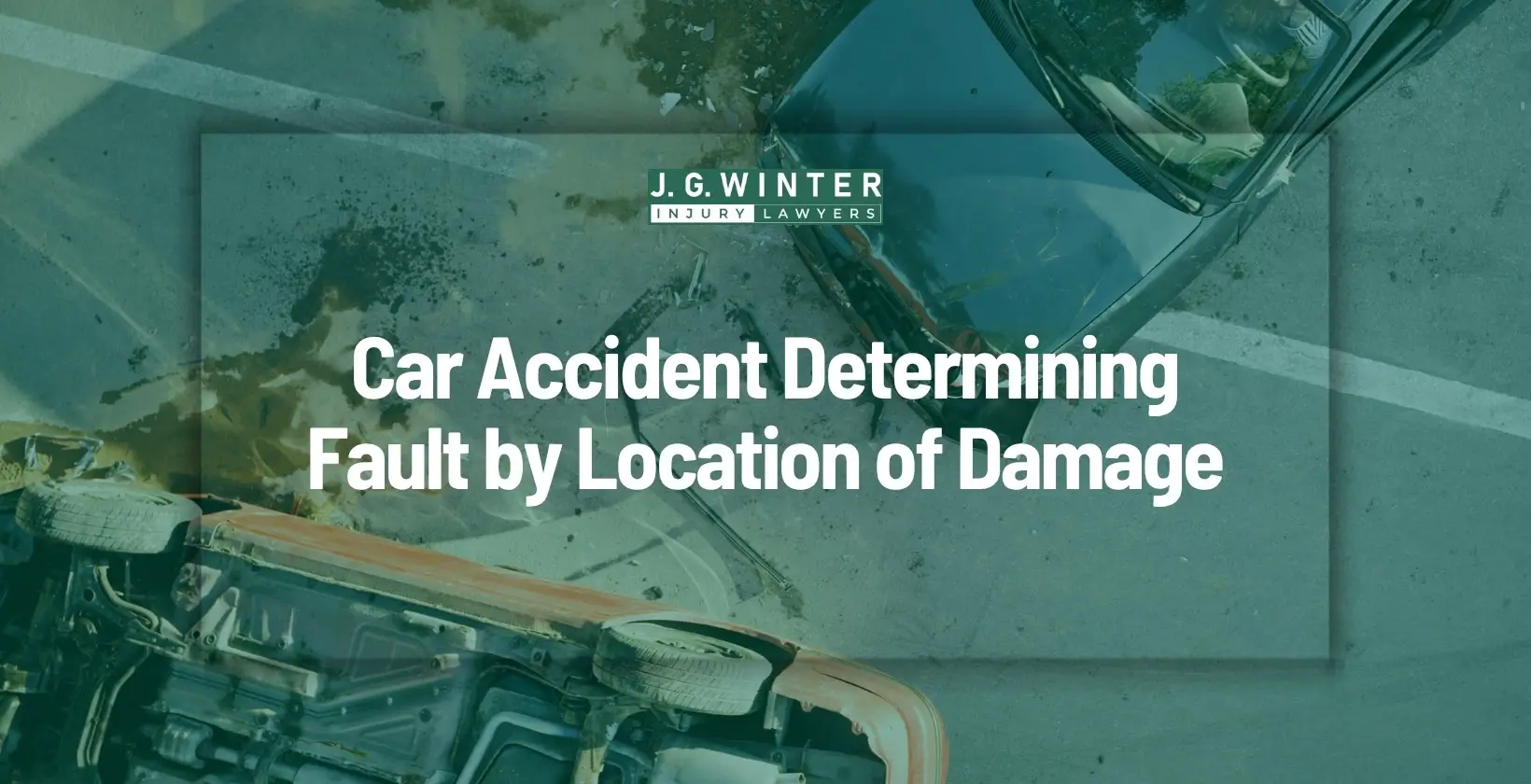A car accident can leave you with physical injuries, financial loss and emotional stress. In such trying times, understanding the concept of negligence becomes crucial to securing the rightful compensation. This legal foundation determines responsibility for the accident and the subsequent financial recovery. Negligence is what you must prove to win a car accident lawsuit, as it directly influences your claim outcome. The process requires demonstrating another party’s lack of care resulted in your injuries and losses.
J.G. Winter Law meticulously addresses critical negligence aspects to help you win your car accident lawsuit. Our car accident lawyers align you with the pathway to justice and recovery.
Understanding negligence in car accident cases
Negligence arises when someone doesn’t provide the necessary caution to avoid causing harm to others. In personal injury law, it’s key to figuring out who is at fault in a car accident. To win a lawsuit, you need to show that the other person didn’t act as carefully as they should have, leading to the accident and your injuries. You must understand negligence to prove that the other driver’s carelessness led to the accident, aiming to achieve fair compensation for your injuries and damages.
Types of negligence claims
Negligence claims can vary depending on the circumstances of each case. Understanding the different types helps you determine the best approach for your car accident lawsuit.
- Comparative Negligence
Comparative negligence evaluates the degree to which each involved party’s actions contributed to an accident. Your potential compensation could be proportionally decreased if you’re partly at fault. This approach ensures that damages are distributed fairly, reflecting each party’s share of fault. - Contributory Negligence
If you’re found to have any fault in causing the accident, you may not receive any compensation under contributory negligence. It is less common but crucial to understand, as even minor fault on your part can bar recovery. - Gross Negligence
Gross negligence goes beyond simple carelessness to include reckless disregard for others safety. Cases involving gross negligence often result in higher compensation due to the severe lack of care the defendant showed. - Vicarious Negligence
Vicarious negligence holds one party responsible for the negligence of another. For example, employers can sometimes be liable for their employee’s actions while on the job. This type of claim is crucial in scenarios where the party directly responsible for negligence operates under someone else’s authority.
The four elements of proving negligence in a car accident lawsuit

You must prove four essential elements to win a car accident lawsuit: Duty of Care, Breach of Duty, Causation, and Damages. Each plays a crucial role to establish the other party’s fault and your right to compensation.
1. Duty of care
The duty of care means that every driver is responsible for acting safely to avoid harming others. It is a legal obligation to ensure personal actions do not cause injury to other road users. For example, drivers owe a duty of care to other drivers, pedestrians, and cyclists. It includes obeying traffic laws, staying alert, and maintaining vehicle control. Failure to uphold these responsibilities can be considered negligence.
2. Breach of duty
A breach of duty occurs when a driver fails to act safely on the road. Common examples include speeding, running red lights, driving under the influence, and distracted driving. To establish a breach of duty in a car accident lawsuit, you must demonstrate that the defendant’s behavior differed from the actions a reasonably careful person would have taken in the same situation, resulting in the accident.
3. Causation
Causation is about linking the breach of duty directly to the accident and the injuries sustained. It’s not enough to show that the defendant acted negligently; you must also prove that their specific actions directly or proximately caused the accident. Direct causation means the actions directly led to the accident, while proximate causation refers to actions that, while not the immediate cause, set off a chain of events that resulted in the accident.
4. Damages
Finally, you must demonstrate that you suffered damages as a result of the negligence. It includes both economic damages, like medical bills, lost wages, and property damage, and non-economic damages, such as pain and suffering or emotional distress. Documenting these losses is important to establish the full impact of the negligence on your life and forms the basis of your compensation.
Collecting evidence to prove negligence in a car accident lawsuit
Proving negligence in a car accident lawsuit involves gathering comprehensive evidence. It supports your claim, from showcasing the other party’s lack of care to demonstrating the extent of your damages.
- Documentation: Collect all possible documents related to the accident. It includes police reports, medical records, and repair bills, which provide a factual basis for your claims.
- Witness Statements: If anyone saw the accident, their story could support your case. Witnesses can help confirm your version of events.
- Photos and Videos: Pictures or videos from the accident scene are really helpful. They can show the damage and help explain how the accident happened.
- Your Notes: Keeping a diary of your recovery, how you feel, and how the injuries affect your life can show the personal impact of the accident.
J.G Winter Law to prove negligence and win a car accident lawsuit

At J.G. Winter Law, we are committed to proving negligence and winning your car accident lawsuit. Our experienced personal injury attorney Jeremy Gordon Winter understands the complexities of personal injury law and knows how to demonstrate that the other party’s failure to exercise reasonable care led to your injuries. By meticulously gathering evidence, consulting with experts, and crafting compelling legal arguments, we aim to establish the four crucial elements of negligence: duty, breach, causation, and damages. Our goal is to prove the other party’s fault and ensure you receive the compensation you deserve for your injuries, losses, and suffering. Trust us to navigate the legal system on your behalf and fight for the justice you deserve. Contact us now.
FAQs
What is the definition of negligence?
Negligence is a failure to take reasonable care to avoid causing injury or loss to another person. This can manifest as either taking an action that a careful person would avoid or failing to act in a way that a careful person would, resulting in injury or loss to another.
What distinguishes negligence from intentional harm?
Negligence involves a lack of care or breach of duty that unintentionally causes harm, while intentional harm involves deliberate actions aimed at causing damage or injury to another person.
What is the basic concept of negligence?
The basic concept of negligence centers around the idea of a duty of care one person owes to another. If someone breaches the duty and their actions (or lack thereof) result in harm to another person, they can be considered negligent.
What are the factors of negligence?
The factors of negligence include the existence of a duty of care, a breach of that duty, causation (the breach caused the harm), and damages (the plaintiff suffered a loss or injury).
What is an example of a negligence case?
An example of a negligence case is a car accident where one driver runs a red light and hits another vehicle. The driver who ran the red light failed to exercise the necessary caution expected under the circumstances, directly leading to the accident and potential injuries or damages to the other party. This scenario highlights a clear breach of the duty of care owed to other road users, forming the basis of a negligence claim.
What are the 5 rules of negligence?
The 5 rules of negligence are:
- Duty of Care: a legal obligation to avoid causing harm;
- Breach of Duty: failing to meet the standard of care;
- Cause in Fact: the breach directly caused the injury;
- Proximate Cause: the scope of the defendant’s responsibility;
- Damages: the plaintiff suffered actual harm or loss.
How does comparative negligence affect a lawsuit?
Comparative negligence potentially reduces the plaintiff’s compensation based on their percentage of fault. If the plaintiff is found partly responsible for the accident, their damages award is decreased by their share of fault.
Can negligence be claimed without physical injuries?
You can claim negligence without physical injuries if the plaintiff suffered other types of harm, such as emotional distress or property damage, as a direct result of the defendant’s negligence.
What do you need to win a negligence case?
To win a negligence case, you need to prove all elements of negligence: duty of care, breach of duty, causation, and damages. Moreover, gathering evidence like witness statements, expert testimonies, and documentation of your injuries and expenses is crucial.
Can a negligence case settle out of court?
You can settle your negligence case out of court through negotiations with the other party. Out-of-court settlements are common because they can provide a quicker resolution, reduce legal expenses, and give both sides more control over the outcome.




